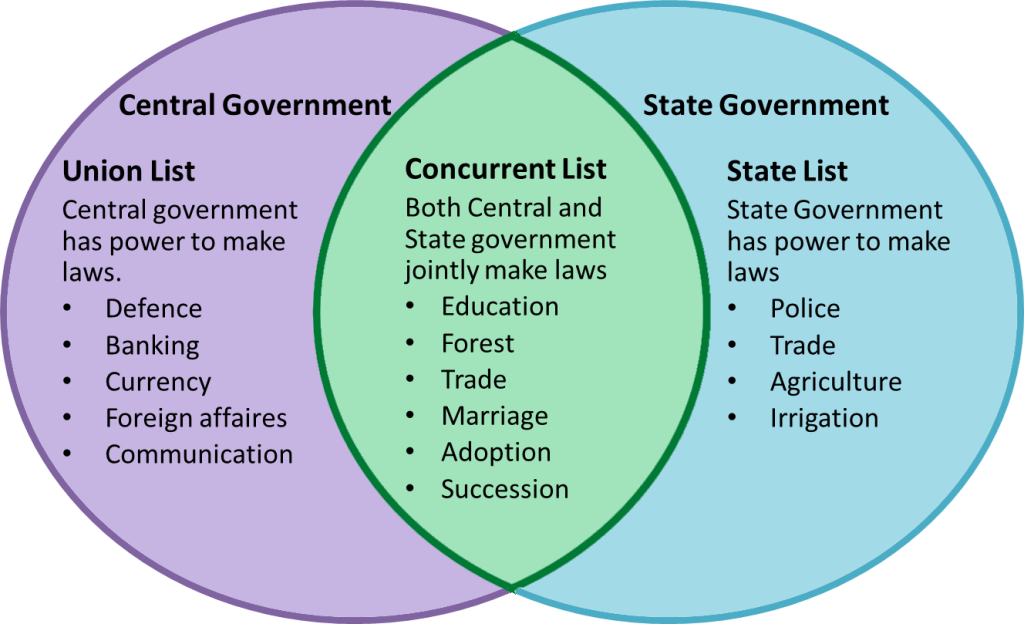Both the Central and State governments in India are given legislative authority under the Concurrent list, one of the three lists in the seventh schedule of the Indian Constitution. It comprises topics that call for national legislation to be uniform but aren’t always necessary for the country to function as a whole. 47 topics were initially on the list; however, the 42nd Amendment Act of 1976 raised that number to 52. Subjects in the Concurrent List: An Overview of India’s Federal Governance in 2023
Subjects in the Concurrent List
The Concurrent list includes major topics including population control, family planning, criminal legislation, and education. The legislation approved by the Parliament has priority over laws passed by State legislatures on similar issues where there is a disagreement. The Concurrent list promotes a uniform approach to important areas of law in India and plays a critical role in cooperative government.

(image source: google)
Introduction:
The seventh schedule of the Indian Constitution has three lists: the Union list, the State list, and the Concurrent list. The Concurrent list permits both levels of government to pass laws on specific issues, unlike the Union and State lists, which give the Central and State governments exclusive legislative authority. The importance of the Concurrent list in 2023 and its influence on Indian legislative policy will be discussed in this article.
Significance of the Concurrent List:
The Australian Constitution served as a model for the concurrent list provision in the Indian Constitution. It acts as a “grey area” under the Constitution, containing topics that fall under the scope of both national and regional issues. In order to promote cooperative governance and solve issues that benefit from joint legislative authority, the concurrent list is essential.
Understanding the Concurrent List:
The topics on the Concurrent list are those that both the Central and State governments can pass legislation on. It covers issues that call for national legislation to be uniform, even if they may not be necessary for the country as a whole to operate. The existence of a concurrent list enables shared accountability and cooperative governance between Central and State authorities.
Growth in the Concurrent List:
The Concurrent list, which originally included 47 subjects, was expanded by the 42nd Amendment Act of 1976. 52 items were added after five subjects were moved from the State list to the Concurrent list. By guaranteeing a cohesive approach to important areas of law, this amendment sought to improve cooperation and streamline government.
Key Subjects under the Concurrent List:
The Concurrent list encompasses a wide range of subjects. Education (including technical and medical education, universities), population control and family planning, criminal law, preventing animal cruelty, protecting wildlife and animals, protecting forests, and other significant topics are only a few of the key topics discussed. The common interests and concerns of the Central and State governments are reflected in these topics.

Important Subjects under the Concurrent List in points:
- Criminal law and Criminal code procedure
- Preventive detention for reasons connected with the security of a State, the maintenance of public order, or the maintenance of supplies and services essential to the community; persons subjected to such detention.
- Transfer of property other than agricultural land; registration of deeds and documents
- Bankruptcy and insolvency
- Trust and Trustees
- Administrators-general and official trustees
- Prevention of cruelty to animals
- Civil procedure, including all matters included in the Code of Civil Procedure at the commencement of this Constitution, limitation, and arbitration.
- Economic and social planning
- Price control
- Trade unions, industrial and labour disputes
- Legal, medical, and other professions
- Archaeological sites
Legislative Authority and Conflicts:
The legislation passed by the Parliament has priority over laws made by State legislatures on similar issues in cases where they clash. This guarantees consistency and prevents variations in the legal system across the nation. The legislative power of the Parliament in these circumstances emphasises the value of a centralised strategy when disputes occur.

Subjects in the Concurrent List :
- Criminal Law: The Concurrent List includes issues pertaining to criminal offences, criminal process, and the administration of justice. In order to preserve a balance between national and local issues, this enables both the Union and state governments to establish laws related to crimes and their penalties.
- Marriage and Divorce: Another topic on the Concurrent List is the regulation of marriage and divorce, including the prerequisites and legality of such institutions. Although these matters are governed by the private laws of local towns, concurrent jurisdiction permits the central government to create standard laws for all residents.
- Insolvency and Bankruptcy: The Concurrent List contains items related to legislation governing insolvency and bankruptcy, including the creation of tribunals. This guarantees a thorough legal framework to handle financial crises and encourage company expansion.
- Education: The Concurrent List contains education as a subject, enabling legislation on topics including educational institutions, educational standards, and vocational training on the part of both the Union and state governments. This shared duty makes it possible for the country as a whole to establish a strong and inclusive educational system.
- Protection of animals and Environment: The Concurrent List covers the preservation and protection of animals, forests, and the environment. This makes it possible to create comprehensive policies that combine national conservation objectives with the unique requirements of many states.
- Guardianship and Adoption: The Concurrent List includes issues pertaining to the adoption and guardianship of children. This guarantees that legislation regulating adoption procedures are uniform across the nation while taking cultural and regional sensitivities into account.
- Trade Unions: Another topic on the Concurrent List is the regulation of trade unions and industrial disputes. This makes it possible for the federal and state governments to pass laws governing workers’ rights, guaranteeing a pleasant workplace.
- Social Security and Social Insurance: Topics linked to social security and social insurance are covered on the concurrent list, including programmes for worker welfare, labour welfare, and the defence of economically disadvantaged groups in society.
Conclusion :
The subjects addressed on the Concurrent List serve as an example of how India’s federal government works together. The formulation, execution, and enforcement of policies are effectively ensured by the cohabitation of Union and state jurisdiction in these areas. These topics include a variety of sociopolitical concerns, including criminal justice, education, and environmental preservation.
A cooperative federalism paradigm that promotes communication and cooperation between the federal and state governments is fostered through concurrent jurisdiction. It enables the creation of comprehensive programmes that strike a balance between regional diversity and national goals. By enabling the exchange of resources, knowledge, and experiences between the Union and the states, this collaborative approach enhances the federal system and encourages effective government.
As India progresses in 2023, the subjects in the Concurrent List will continue to play a vital role in shaping the nation’s socio-political landscape. India can enhance its federal system and strive towards equitable and sustainable development by appreciating the value of the Concurrent List and encouraging cooperative federalism. The efficient use of the Concurrent List will be made possible by ongoing communication and cooperation between the federal and state governments, ensuring that the different needs and aspirations of the Indian population are satisfied by carefully coordinated policies and laws. Together, the federal and state governments can manage the intricacies of governance, promote peace, and work to ensure that all citizens have a prosperous and just future.

